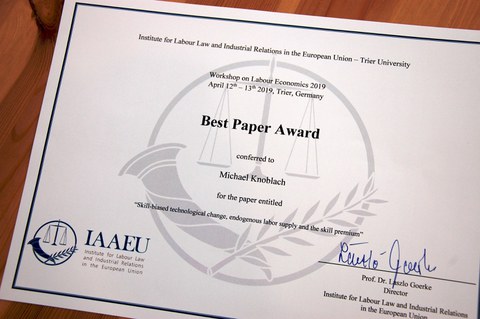May 06, 2019
Best Paper Award für Michael Knoblach
Für seinen Beitrag „Skill-Biased Technological Change, Endogenous Labor Supply, and the Skill Premium“ wurde Michael Knoblach (Professur für VWL, insb. Wirtschaftspolitik und Wirtschaftsforschung) mit dem Best Paper Award des 11. Workshop on Labour Economics ausgezeichnet. Der in Trier beheimatete Workshop, der sich im Feld der Personal- und Arbeitsmarktökonomik im europäischen Raum als eine bekannte Größe etabliert hat, steht unter der Schirmherrschaft des Instituts für Arbeitsrecht und Arbeitsbeziehungen in der Europäischen Union (IAAEU). Der Preis wurde am 13. April durch das Organisationskomitee der Konferenz um Herrn Prof. Dr. Laszlo Goerke verliehen. In diesem Jahr wurden 34 Papiere auf dem Workshop vorgestellt.
Der theoretische Aufsatz „Skill-Biased Technological Change, Endogenous Labor Supply, and the Skill Premium“ widmet sich der Frage, wie sich die Entlohnung hoch- und niedrigqualifizierter Arbeitskräfte durch technologischen Fortschritt und zunehmendem Kapitaleinsatz kurz- und langfristig ändert. Im Fokus der Arbeit steht die Entwicklung unterschiedlicher Ansätze, mit deren Hilfe sich der U-förmige Verlauf des bildungsspezifischen Lohndifferentials erklären lässt.
Abstract des Papers:
The development of the U.S. college premium over recent decades has been characterized by a “U-shaped” pattern. The empirical literature attributed this observation mainly to the presence of skill-biased technological change (SBTC). In this paper, we study the dynamics in the composition of labor and the development of the skill premium in a two-sector growth model characterized by technological change (TC) that is favorable towards high-skilled labor and sectoral differences in the substitutability between capital and labor. Within this framework, we derive the conditions necessary to achieve a U-shaped evolution of relative wages and analyze the dynamics of such a case. We show that for various parameter constellations, in the short-run an educational and a relative substitutability effect decrease the skill premium despite a moderate growth in the relative productivity of high-skill labor.
In the long run, as the difference in labor productivity increases, the skill premium rises as well. Besides our theoretical results, we conduct a comprehensive simulation study to generate time series of our model.
